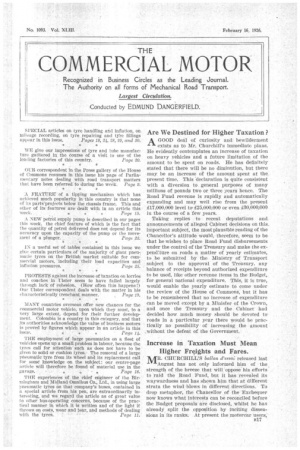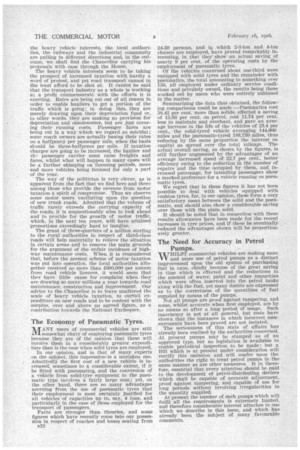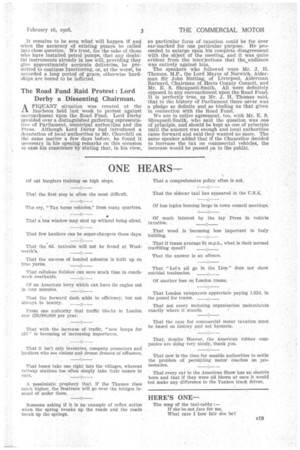Are We Destined for Higher Taxation ?
Page 1

Page 2

Page 3

If you've noticed an error in this article please click here to report it so we can fix it.
A GOOD deal of curiosity and bewilderment exists as to Mr. Churchill's immediate plans. He evidently contemplates an increase of taxation on heavy vehicles and a future limitation of the amount to be spent on roads. He has definitely stated that there will be no diminution, but there may, be an increase of the amount spent at the, present time, This 'declaration is quite consistent with a diversion to general purposes of many millions of pounds two or three years hence. The Road Fund revenue is rapidly and automatically expanding and may well rise from the present £17,000,000 level to £25,000,000 or even £30,000,000 in the course of a few years.
Taking replies to recent deputations and announcements of alleged Cabinet decisions on this. Important subject, the most plausible reading of the Chancellor's attitude would, therefore, seem to be that he wishes to place Road Fund disbursements under the control of the Treasury and make the expendaure on roads a matter a yearly estimates, to be submitted by the Ministry of Transport subject to the approval of the Treasury, any balance of receipts beyond authorized expenditure to be used, like other revenue items in the Budget, for general national expenditure. This, it is true, would enable the yearly estimate to come under the review of the House of Commons, but it has to be remembered that no increase of expenditure can be moved except by a Minister of the Crown, and once the Treasury and the Cabinet had decided how much money should be devoted to roads in a particular year there would be practically no possibility of increasing the amount ,without the defeat of the Government.
Increase in Taxation Must Mean Higher Frights and Fares.
MCHURCHILL:S ballon d'essai released last R. "LT-a-August has not only informed him of the strength of the breeze that' Will oppose his efforts to raid the Road Fund, but it has revealed its waywardness and has shown him that at different strata the wind 'blows in different directions. To drop metaphor, the Chancellor of the Exchequer now knows what interests can be reconciled before the Budget proposals are disclosed, whilst he has' already. plit the opposition by inciting dissensions in its ranks. At present the InotorCar users,
the heavy vehicle interests, the local authorities, the railways and the industrial community are pulling in different directions and, in the outcome, we shall find the Chancellor carrying his proposals with ease through the House. The heavy vehicle interests seem to be taking the prospect of increased taxation with hardly a word of protest, and yet road transport cannot in the least afford to be shot at. It cannot be said that the transport industry as a whole is working ac a profit commensurate with the efforts it is exerting. Rates are being cut out of all reason in order to enable hauliers to get a portion of the traffic which is going; in doing this, they are merely drawing upon their depreciation fund or, in other words, they are making no provision for depreciation and obsolescence, but are just cover ing their running costs. Passenger fares are being cut in a way which we regard as suicidal; some coach owners are actually basing their rates on a halfpenny per passenger mile, when the basis should be three-halfpence per mile. If taxation charges are going to be increased, the haulier and th') passenger carrier must raise freights and fares, whilst what will happen in many cases will be a further skimping on licensing periods, more and more vehicles being licensed for only a part of the year.
The way of the politician is very clever, as is apparent from the fact that we find here and there among those who provide the revenue from motor taxation a spirit of compromise. Thus we observe some motor users vacillating upon the question of new trunk roads. Admitted that the volume of traffic rarely exceeds the carrying capacity of the roads, it is unquestionably wise to look ahead and to provide for the growth of motor traffic, which, in the next ten years, will have attained proportions exceedingly hard to imagine.
The grant of three-quarters of a million sterling to the rural authorities in respect of third-class roads will help materially to relieve the situation In certain areas and to remove the main grounds for the argument of the unfair incidence of high way maintenance costs. When it is remembered that, before the present scheme of motor taxation was put into operation, the local authorities altogether received no more than £600,000 per annum from road vehicle licences, it would seem that they have little cause for complaint when they are drawing so many millions a year towards road maintenance, construction and improvement. Our advice to the Chancellor is to leave unaltered the scale of heavy vehicle taxation, to curtail expenditure on new roads and to be content with the surplus, over and above an agreed figure, as a eontributiontowards the National Exchequer.
The Economy of Pneumatic Tyres.
ir ANY users of commercial vehicles are still 13'J-somewhat chary of employing pneumatic tyres because they are of the opinion that these will involve them in a considerably greater expenditure than is the ease when solid tyres are employed.
In our opinion, and in that of many experts on the subject, this impressionsis a mistaken one. Admittedly the first cost of a new vehicle is increased, sometimes to a considerable extent, if it he fitted with pneumatics, and the conversion of a vehicle from solid-tyre equipment to the pneumatic type involves a fairly large sum; yet, on the other hand, there are so many advantages accruing from the use of pneumatic tyres that their employment is most certainly justified for all vehicles of capacities up to, say, 4 tons, and particularly In the ease of those employed for the transport of passengers.
Facts are stronger than theories, and some figures which have recently come into our possession in respect of coaches and buses seating from ft18 24-30 persons, and in which 2-3-ton and 4-ton chassis are employed, have proved remarkably in teresting, in that they show -an actual saving of nearly 9 per cent, of the operating costs by the employment of pneumatic tyres.
Of the vehicles concerned about one-third were equipped with solid tyres and the remainder with pneumatics, the total amounting to something over 150, all employed under ordinary service conditions and privately owned, the results being those worked out by users who were entirely unbiased in the matter.
Summarizing the data thus obtained, the following comparisons could be made :—Pneumatics cost 38.42 per cent. more than solids, effected a saving of 15.83 per cent. on petrol, cost 11.74 per cent. less to maintain and overhaul, and gave an average increase in the life of the vehicles of 23.4 per cent., the solid-tyred vehicle averaging 144,1100 miles and the pneumatic-tyred 188,730 miles, thus reducing by the same proportion the interest on capital as spread over the total mileage. The actual overall saving, as shown by the figures, is still further augmented by the advantages of an average increased speed of 22.7 per cent., better efficiency owing to the reduction in the number of repairs and the time occupied by them, and in creased patronage, for intending passengers show a marked preference for a vehicle running on pneumatic tyres.
We regret that in these figures it has not been possible to deal with vehicles equipped with cushion tyres, for, in our opinion, theme form a very satisfactory mean between the solid and the pneumatic, and should also show a considerable saving over those with the plain solid.
It should be noted that in connection with these results allowances have been made for the recent increases in tyre prices, and if these be eventually reduced the advantages shown will be proportionately greater.
The Need for Accuracy in Petrol Pumps.
WHILST commercial vehicles are making more and more use of petrol pumps as a distinct improvement upon the old system of purchasing
fuel in cans, chiefly because of the great saving in time which is effected and the reductions in the amount of water, paint and other impurities which were often inserted into the petrol tanks along with the fuel, yet many doubts are expressed as to the correctness of the quantities of fuel supplied by means of the pumps. Not all Wimps are proof against tampering, and some, whilst accurate when first employed, are by no means so after a long period of usage. Such inaccuracy is not at all general, but tests have shown that the instances in which incorrect measurements have been proved are not isolated.
The seriousness of this state of affairs has already been realized by the authorities concerned. At present pumps may be stamped as of an approved type, but no legislation is available to enable periodical inspection to be made ; but a Bill which is at present under consideration will rectify this omission and will confer upou the authorities the right to treat petrol pumps in the same manner as are other measures. It is, there
fore, essential that every attention should be paid to the development of petrol-distributing devices which shall be capable of accurate adjustment, proof against tampering, and capable of use for long periods without involving irregularities in the quantity supplied. At present the number of such pumps which will fulfil all the requirements is extremely limited, and therefore considerable interest attaches to one which we describe in this issue, and which has already been the subject of many favourable comments. It remains to be seen what will happen if and when the accuracy of existing pumps be called into close question. We trust, for the sake of those who have installed petrol pumps, that any doubtful instruments already in use will, providing they give approximately accurate deliveries, be permitted to continue functioning, or, at the worst, be accorded a long period of grace, otherwise hardships are bound to be inflicted.
The Road Fund Raid Protest : Lord Derby a Dissenting Chairman,
APIQUANT situation was created at the luncheon held last week to protest against encroachment upon the Road Fund. Lord Derby presided over a distinguished gathering representative of Parliament, municipal authorities and the Press. Although Lord Derby had introduced a deputation of local authorities to Mr. Churchill on the same matter a few days before, he found it necessary in his opening remarks on this occasion to ease his conscience by stating that, in his view, no particular form of taxation could be for ever ear-marked for one particular purpose. Be proceeded to enlarge upon his complete disagreement with the object of the meeting, and it was quite evident from the interjections that the,..audience was entirely against him.
The speakers who followed were Mr. J. II. Thomas, M.P., the Lord Mayor of Norwich, Alderman Sir. John Nutting, of Liverpool, Alderman Barnard, Chairman of Herts County Council, and Mr. E. S. Shrapnell-Smith. All were definitely opposed to any encroachment upon the Road Fund: It is perfectly true, as Mr. J. H. Thomas said that in the history of Parliament there never was a pledge so definite and so binding as that given in connection with the Road Fund.
We are in entire agreement, too, with Mr. E. S. Shrapnell-Smith, who said the question was one of principle, and should be kept as one of principle until the amount was enough and local authorities came forward and said they wanted no more. The same speaker added that if the Chancellor decided to increase the tax on commercial vehicles, the increase would he passed on to the public.
































